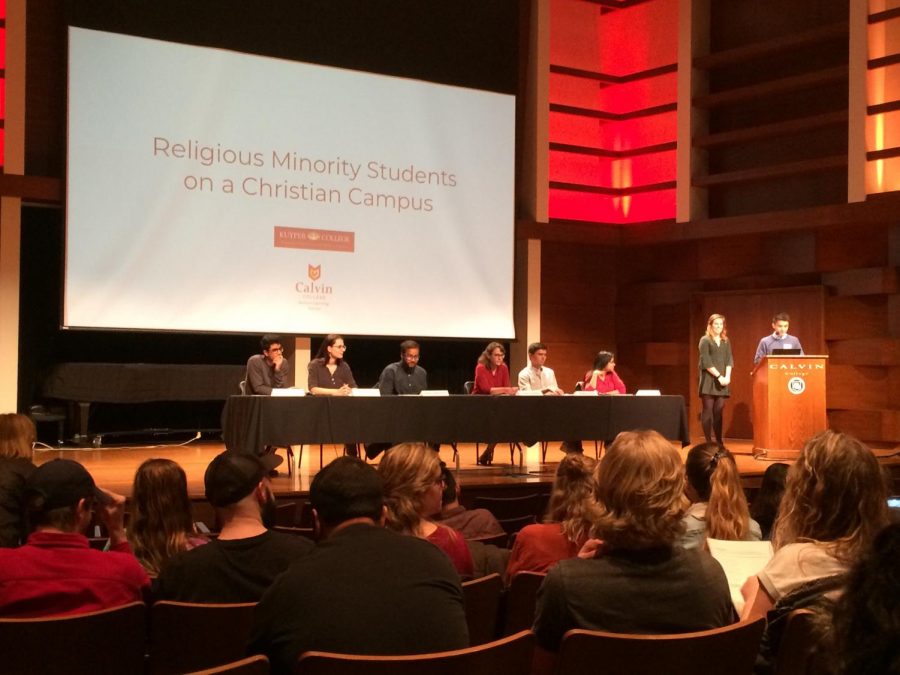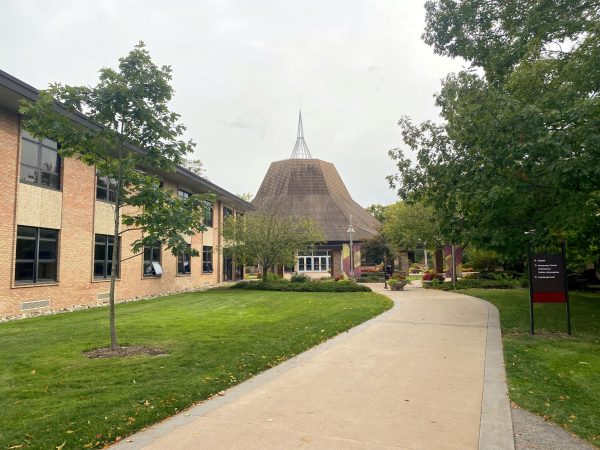Religious minority students at Christian college discuss challenges, benefits
“They started staring at me weirdly and asked ‘Are you Muslim?’” This is part of the story of sophomore Blerta Lika, who is a mathematics major at Calvin College. She is also a Muslim. Lika was one of five students who spoke at the Religious Minority Students on a Christian Campus Panel Discussion. The event, which took place Tuesday, November 4, was organized jointly by Calvin College Interfaith and Kuyper College, with the goal of educating Calvin students about the experiences of their non-Christian peers. The event drew a crowd of 120 people, which is a record-breaking turnout for a Calvin College Interfaith event.
Four muslims and two non-religious students spoke at the panel. One of the non-religious students, senior Leeana Koster, explained how she came to the beliefs she holds today. She shared that her family raised her in the Christian Reformed Church but had a “toxic relationship with Christianity.”
After a traumatic robbery, many people told her that “God was there with you” and “God protected you.” Koster shared how much these sorts of words hurt, saying, “I was there and I didn’t see any god there. I came to realize that Christianity wasn’t a good or necessary thing in my life.”
Sophomore Tuba Jaherun, another panelist, spoke about the difficulties of observing her Muslim faith while at Calvin, saying, “Food is hard for me here because I can’t eat all kinds of meat.” She later added that it’s hard to fit prayer into her daily schedule because of classes. This sentiment was echoed by another Muslim student, Samiur Rahman, class of 2020.
“Halal meat is expensive,” Rahman pointed out.
Panelist Matthew Bone, a junior, talked about his beliefs, or lack thereof, and how Calvin’s policies towards religious minorities have affected him. He grew up in a Christian family but now identifies as non-religious. Bone explained the reasons for his transition, saying, “Christianity didn’t make sense; there never was a reason to believe it.”
He then went on to describe how these beliefs put him at odds with Resident Life. “Last year, I was an RA but I was asked to step down because I wasn’t a Christian”
He called this incident “the biggest issue [of being a non-Christian at Calvin] for me.” Bone noted that the people involved in the situation “treated me as well as they could; it’s [Calvin’s] position and rules that are wrong.”
For Rahman, a Sunni Muslim from Bangladesh, a common question that he hears when people learn of his faith is “Why are you here [at Calvin]?” He explained to the audience: “I got a scholarship!”
When asked a similar question, Koster noted that as a longtime resident of Grand Rapids, she foresaw that life as a non-Christian at Calvin might be difficult. “I knew what I was getting into,” said Koster. “I anticipated tensions.”
The students also talked about the challenges in the classroom. Panelist Danish Ansari, class of 2021, who is a biology major from Nepal, talked about the difficulties that “answer this from a Christian perspective” test questions present. “When I asked him about it, the professor said ‘just assume you are a Christian and answer it that way,’” said Ansari. Another facet of his Calvin experience was that people asked if he would ever convert to Christianity. Koster said that during class discussions some students seemed to assume that if a person is not a Christian, then they do not have morals.
The panelists also recognized positive aspects of their Calvin experiences.
“I didn’t feel like I was excluded because of my race or religion,” Rahman said.
Koster spoke warmly of the faculty. “I love my professors — they are the best part of Calvin,” she said.
The panel moderator Manato Jansen, who is Calvin’s Interfaith Coordinator, shared about the mission of Calvin College Interfaith: “Our goal at Calvin is for people of different religious, spiritual and secular traditions to better understand each other.” He also noted that Calvin is home to even more religious diversity than the panel showcased, as students who are Jewish, Hindu, Buddhist and of other religions also attend Calvin.
During the question and answer time, the panel members replied to a member of the audience who asked how Christian students can be more accepting to those of other religions. “Don’t make someone feel less than you because they are different,” said Jaherun.
Koster adviced to “ask questions and be curious. Don’t judge.”







